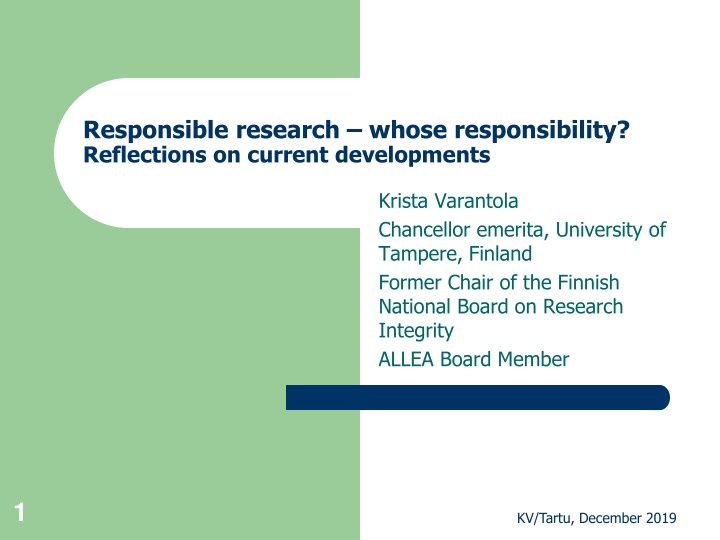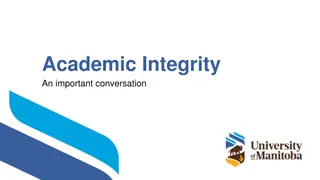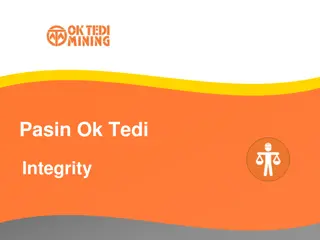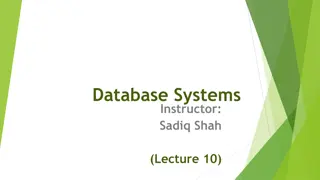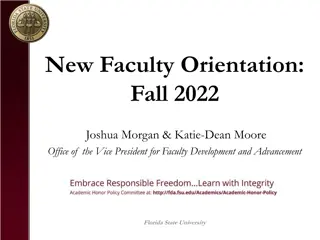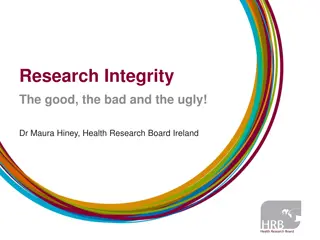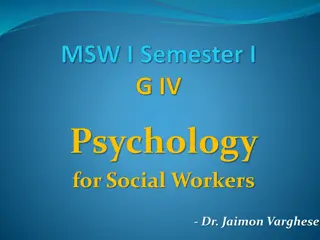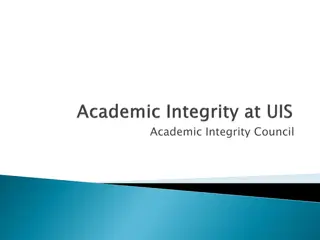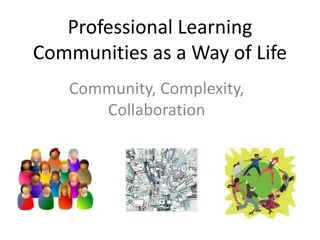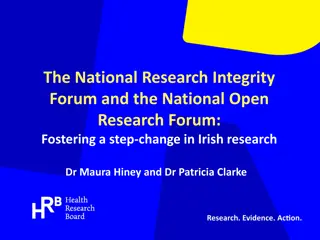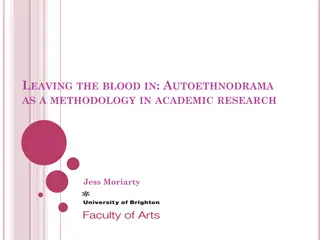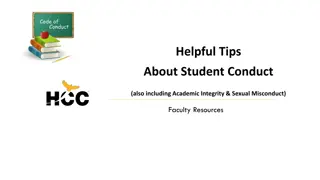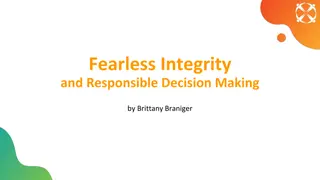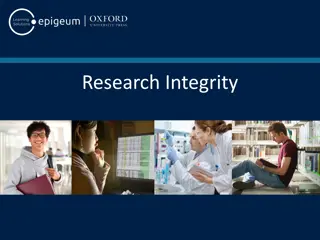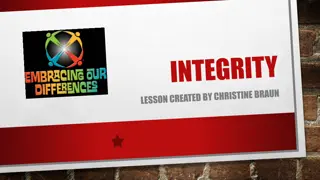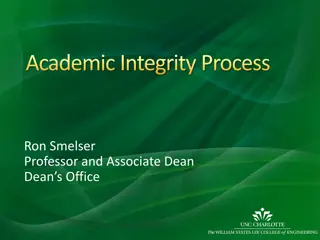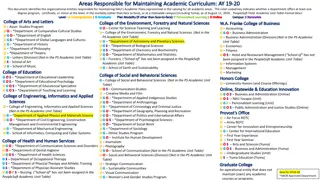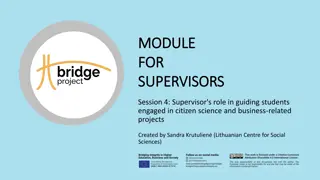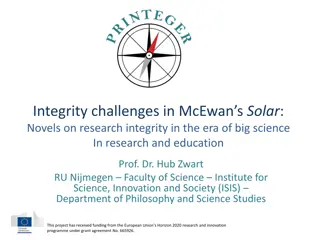Reflections on Research Integrity and Responsible Behavior in Academic Communities
Discussion on the importance of addressing research integrity and ethical behavior within the academic community, emphasizing the need for a code of conduct, guidelines for responsible research practice, and regular updates to ensure good research behavior is taught and practiced throughout researchers' careers. The distinction between research ethics, research integrity, and responsible research is explored, highlighting the significance of understanding and implementing these concepts in all fields.
Uploaded on Nov 24, 2024 | 2 Views
Download Presentation

Please find below an Image/Link to download the presentation.
The content on the website is provided AS IS for your information and personal use only. It may not be sold, licensed, or shared on other websites without obtaining consent from the author.If you encounter any issues during the download, it is possible that the publisher has removed the file from their server.
You are allowed to download the files provided on this website for personal or commercial use, subject to the condition that they are used lawfully. All files are the property of their respective owners.
The content on the website is provided AS IS for your information and personal use only. It may not be sold, licensed, or shared on other websites without obtaining consent from the author.
E N D
Presentation Transcript
Responsible research whose responsibility? Reflections on current developments Krista Varantola Chancellor emerita, University of Tampere, Finland Former Chair of the Finnish National Board on Research Integrity ALLEA Board Member 1 KV/Tartu, December 2019
Do we really need all this fuss about Research Integrity? Because The research community is in essence a very honest community There is no need for an elaborate, work-intensive mechanism for the sake of a few individuals Misconduct will be detected anyway The legal system is capable of dealing with accusations of misconduct and their sanctioning Our societies have a lot of trust in science and scientific results (The top three trustworthy institutions in Finland are the police 83%, The armed forces 79%, the university sector 77% according to Finnish Science Barometer 2019) 2 KV/Tartu, December 2019
Yes, we do need to talk about research integrity and ethical behaviour Because What an ethical mindset in research means in practice is not an innate characteristic and needs to be elaborated Good research behaviour needs to be taught and explained and practised hands-on throughout the research career A Code of Conduct for RI is a kind of Little Golden Book on Research Manners - a current understanding of what responsible research means Guidelines therefore describe what is good and responsible research practice, what is not, and how violations of good research practice are/should be dealt with in the appropriate contexts Framework/national /institutional level documents naturally differ in terms of concreteness Need for regular updates Open science open access, open data and data management major open issues 3 KV/Tartu, December 2019
Research ethics vs. research integrity vs. responsible research How do the concepts differ? - No consensus on the hierarchy of the concepts but in practice often research ethics seen as the umbrella concept (that also includes the benefits/ drawbacks of scientific endeavour, moral aspects, trust in science, etc.) research integrity a subordinate concept that refers to proper and responsible behaviour and practices at different levels and roles in the research system and is applicable in all fields Normative codes and legislation in research refer to field-specific professional rules and regulations usually monitored by governing bodies e.g. in medical, health care, biotechnology contexts, etc. Responsible research an increasingly common and undefined expression with a wide scope 4 KV/Tartu, December 2019
Research Integrity Whose responsibility? RI guidelines usually emphasize that individual researchers are always responsible for their research outputs They can claim ownership and credit for the research product The guidelines therefore describe what is good and responsible research practice, what is not, and how violations of good research practice are/should be dealt with Therefore investigations of misconduct and sanctions usually focus on individual behaviour only This is, however, not the whole picture 5 KV/Tartu, December 2019
RI - Whose responsibility? ALLEA The European Code of Conduct for Research Integrity The whole research system and research community has a role in promoting RI. Thus the Code is written For individual researchers (responsible conduct, handling of alleged violations, sanctions, responsibility in different roles, junior, senor reviewer, assessor...) For research groups (respect for fellow researchers, openness and transparency) For research performing institutions and organizations (training of junior and senior researchers, clear and transparent procedures for guidance and investigations, research and quality culture) All these aspects are also included in the Estonian Code 6 KV/Tartu, December 2019
The Bonn-Printeger Statement about Institutional Guidelines Providing information about research integrity Providing education, training and mentoring Strengthening a research integrity culture Facilitating open dialogue Wise incentive management Implementing quality assurance procedures Improving the work environment and work satisfaction Increasing transparency of misconduct cases Opening up research Implementing safe and effective whistle-blowing channels Protecting the alleged perpetrators Establishing a research integrity committee and appointing an ombudsperson Making explicit the applicable standards for research integrity KV/Tartu, December 2019 7
Research integrity is an educated mindset and applies to Individual researchers Peers, seniors, juniors, research groups The research community in general Institutional decision makers Quality assurance Funding organizations Quality assurance and responsible use of public finances Political/Policy responsibility - Political decision makers, in particular bodies making science-political decisions about the criteria used for public research funding or for funding formulae 8 KV/Tartu, December 2019
Who gets the blame for collective misbehaviour or mismanagement? At research system level Institutions are rarely punished for sloppy institutional behaviour or lack of RI structures but the pressure is increasing as well as media attention Bonn Printeger Statement Publishers and publications are rarely boycotted for manipulation (except for predatory OA journals) but times are changing OA criteria and researchers rights Funding organisations are normally free to decide on their funding criteria but the set of current quantitative criteria are now challenged DORA, Plan S 9 KV/Tartu, December 2019
Paradigm change in the air? A responsible research system RI now often used as an umbrella concept referring to responsible research and responsible research culture - the ethos of science is back in focus which has shifted to such themes as Research and researcher assessment, DORA, (Hong Kong World conference on RI 2019), EUA, Science Europe, ALLEA Institutional responsibilities Open science and OA/OD publisher responsibilities Publication ethics and Plan S Recruitment and reviewer criteria and instructions 10 KV/Tartu, December 2019
Make science great again on its own terms! What is in the making? The borderline between research ethics and research integrity getting blurred End of the quantitative competition era and the new public management philosophy in sight? New ways assessing the impact of research and researcher performance A system review needed - ALLEA response to Plan S 11 KV/Tartu, December 2019
Plan S a catalyst From the ALLEA response: ALLEA emphasises that, as recognised by Plan S, the move to full open access must be accompanied by concurrent reforms of the systems for research evaluation and career progression; it will thus require a fundamental re-evaluation of the responsibilities of all the different actors in the research system. Particular attention must be paid to the impact on early stage researchers, those from disadvantaged institutions and communities, and those working in specialist disciplines 12 KV/Tartu, December 2019
Work in progress The Academy of Finland is a signatory of Plan S and in the process of starting to implement not only OA principles but renewed application instructions and researcher assessment instructions in line with DORA principles (2020-2021) A recommendation by a large working group on responsible researcher assessment under the auspices of The Federation of Finnish Learned Societies (TSV) Draft to be finalized and made public in March 2020 An ALLEA symposium in April 2020 on Research assessments that promote progress in scholarly work and strengthen the contract with society , Brussels 13 KV/Tartu, December 2019
Dutch developments Wednesday 13 November 2019 Today, the VSNU, NFU, KNAW, NWO and ZonMw are publishing the position paper Room for everyone s talent: towards a new balance in the recognition and rewards for academics in which we indicate how we aim to more broadly recognise and reward the work of academic staff. This includes placing less emphasis on the number of publications, and a greater emphasis on the other domains in which the academic is active, such as education and impact. This broader form of recognition and appreciation is better suited to the current core tasks of knowledge and educational institutions and what society requires of these establishments 14 KV/Tartu, December 2019
A responsible research system- Practical implications The need not to loose the focus of guidelines/recommendations and their scope the need for consistency and compatibility In the Finnish context (tenk.fi) Guidelines Responsible conduct of research and procedures for handling allegations of misconduct in Finland 2012 The ethical principles of research with human participants and ethical review in the human sciences in Finland - (GDPR considerations included Recommendations CV template for researchers (including lists of publications) Agreeing on authorship. Recommendation for research publications SUPERVISION OF DOCTORAL DISSERTATIONS AND THEIR REVIEW PROCESS IN FINLAND WITH A SPECIAL EMPHASIS ON RESEARCH INTEGRITY KV/Tartu, December 2019 15
Other existing and prospective RR codes in the pipeline? Occupational ethical guidelines Norms and regulations Research and researcher assessment (in progress) Institution-specific codes (in addition to national-level principles) Ethical codes for AI planning and implementation Open science -related codes and agreements 16 KV/Tartu, December 2019
Back to Research integrity and RI in practice Reflections and point of view: A national system based on self-regulation Chair of TENK (Finnish National Board on Research Integrity) for three tems 17 KV/Tartu, December 2019
The Finnish system in a nutshell A national system based on self-regulation - Collective oath by research performing institutions (in practice all RPOs and main funders) TENK an appeals court without being a court ten members/3-year mandate Appeals about the procedure National system has resulted in consistency of interpretations and procedures At signatory level RPOs deal with the case according to the procedures described in the guidelines Preinvestigation and if necessary full investigation. TENK is informed. Signatories (RPOs) decide on sanctions locally Self-regulation makes it possible to deal with unacceptable practices (cf. ALLEA Code) Legal issues e.g allegations of financial fraud treated through the legal system 18 KV/Tartu, December 2019
RI A national system in practice A national memory and experience at the institutions A number of well-attended annual ethical events where current issues are debated Ongoing debates on how to improve the system, regular updates with thorough comments rounds A clearing-house character for TENK and an advisory role for the Secreteriat Natural cooperation between stakeholders (RPOs, funding organizations, Uniformity in dealing with allegations A readiness to take part in international activities (ENRIO) Strong support from the governmental level (Quality assurance and responsibily for public spending in Finnish research) Independence with responsibility for promoting RI and RI training 19 KV/Tartu, December 2019
When reality hits 1 How to make it easier for (early career) researchers to discuss RI issues confidentially and take them further ( Introduction of ethical advisers to institutions) How to streamline written complaints (a template) RI issues are highly personal, complaints written a good deal of emotion and stress (workplace issues, personal relations, scholarly disputes, even paranoia ) TENK statements limited to its mandate Cases are complicated and multi-faceted FFP the easiest cases except for plagiarism The scope of plagiarism, plagiarism detection Misunderstanding self-plagiarism 20 KV/Tartu, December 2019
When reality hits 2 Authorship issues multiplied when number of international publications where included in the general funding formula Few written agreements about publication principles in projects Right co-authorship (honorary authorships and disciplinary practices) The cases drag on because of several complaints rounds The losing party does not accept the verdict The media like big cases and like to act as advance courts of law with meagre knowledge of RI principles and procedures (social) mediafication of all disputes a general tendency Politicizing the issue Loss of academic credibility the most severe sanction 21 KV/Tartu, December 2019
Tick-the-box mentality The institutional side Lack of clear internal procedures and an institutional memory Some signatories not aware of what they have signed prefer a defensive hush-hush approach to a quality assurance mindset try to legalise the issue and claim that the breach does not fall within TENKs mandate or within RI Project leaders, seniors transfer unacceptable practices Not interested in taking part in training Believe in entitlement and hierarchies Whistleblower protection (A major international issue (and ENRIO issue) The role of trust Trust is essential but so is healthy mistrust (monitoring needed) 22 KV/Tartu, December 2019
An ethical mindset as a common aim in responsible research Research integrity RI is an integral part of any research performing institutions s quality assurance Training in RI is an integral part throughout the research career RPOs are committed to promoting RI research as an institutional ethos a Misunderstood collegiality is not practised System-level changes in research culture Science-political decision makers need to be involved Criteria for research funding need to be based on a broad assessment of what is good for science on its own terms Stop counting start reading! The vast majority of researchers are or want to be honest 23 KV/Tartu, December 2019
